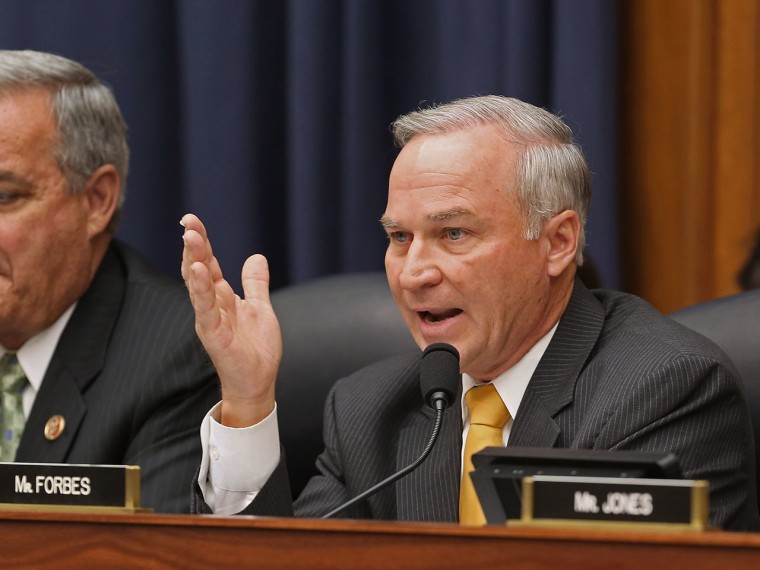At a House Armed Services Committee hearing Tuesday, a number of Republican congressmen injected sequester politics into the debate about whether to take military action in Syria.
"Secretary Kerry, you talked about sending a greater message of national weakness," Congressman J. Randy Forbes (R-Va) said at the hearing. "Which do you think sends a greater message of national weakness--failure to respond with an unbelievably small military response against Syria for using chemical weapons against its own people, or cutting $587 billion out of our national defense, planning to cut 2 to 3 carrier strike groups, reducing our F22 fleet, and destroying 7 Navy cruisers which have twice the firepower of the British Navy?"
"Those aren't the choices on the table," said Kerry.
Republican Reps. Doug Lamborn, Rob Bishop, and Michael Turner also brought up the sequester, citing the furloughs and cutbacks in their districts. Such questions were to the visible consternation of Kerry, who seemed to feel they were tangential to the issue at hand.
The specter of looming budgetary battles has not been absent from the Syria debate thus far. Chairman of the House Armed Services Committee Buck McKeon wrote an op-ed in the Wall Street Journal Monday explaining why he has to vote no on the Syria strike.
"Support for a military strike is uncertain, particularly in the House," wrote Mckeon. "The idea that we would—once again—deploy forces while they are financially strapped weighs heavily on many members, including me, who would otherwise vote in favor of a strike."
On Face The Nation Sunday, McKeon said he would vote yes on Syria strikes if Obama "fixed sequestration." It's unclear, though, what fixing sequestration means for McKeon. As Ian Millhiser noted over at Think Progress, the congressman introduced legislation earlier this year to end the military cuts, while leaving the all the domestic sequestration in place.
Millhiser cites a letter Lawrence J. Korb, assistant secretary of defense in the Reagan administration, wrote to the The New York Times in 2011, explaining why the military could absorb sequestration cuts in a post-Iraq, post-Afghanistan America just fine.
"Since the defense budget has grown by more than 50 percent over the past 10 years, it can easily absorb a 15 percent reduction," writes Kolb, "which would be about half the defense cuts of Presidents Eisenhower and Nixon and less than that of George H. W. Bush."
The point is that bringing sequestration into the larger Syria debate is purely political, as it shouldn't have any effect on America's capability to carry out the limited strikes being proposed. "Holding our military authorization hostage for what is, ultimately, an irrelevant desire to fund the military at Iraq War levels is the height of cynicism," says Millhiser.
Mentions of the sequester do highlight the tough budget fight congress is primed to have over the debt ceiling, which we're scheduled to hit as early as October 18th.
